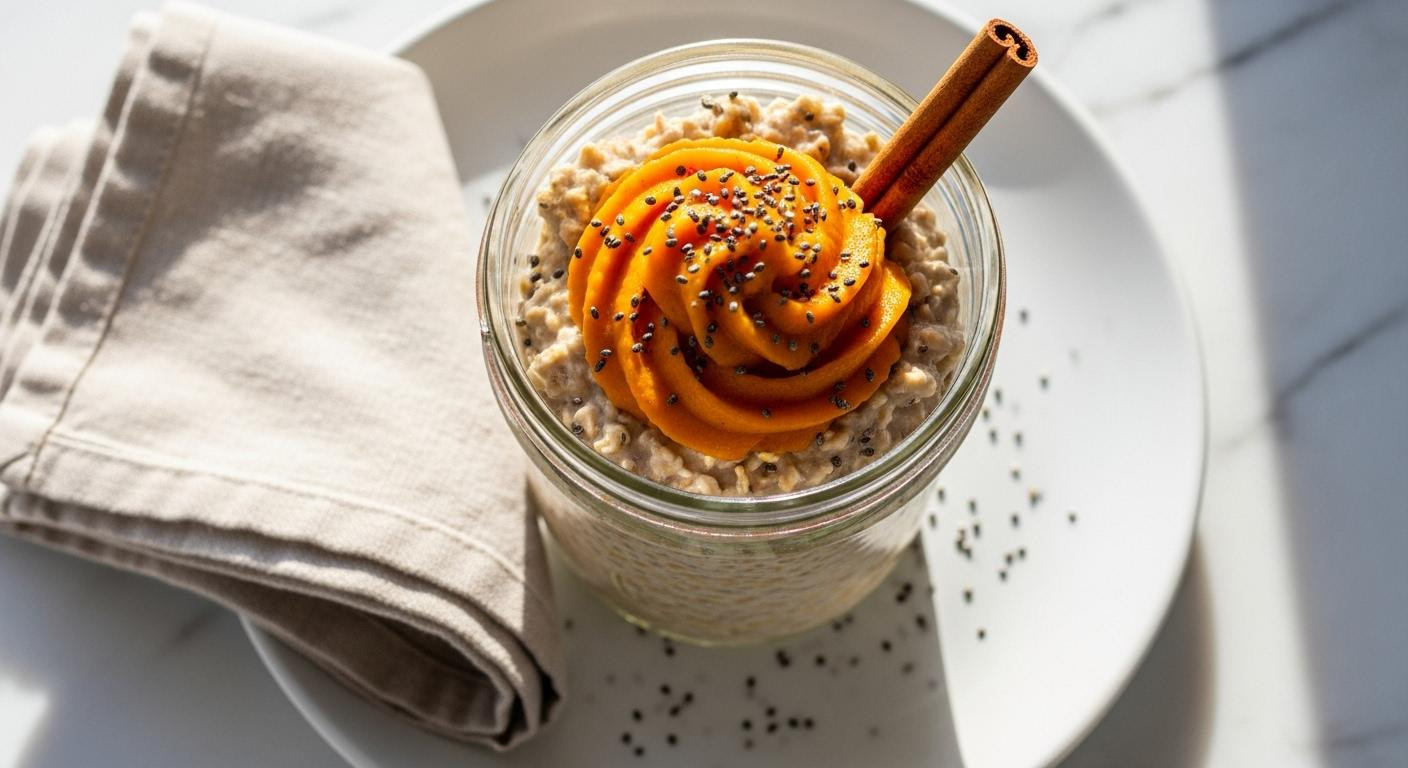Your morning café açai bowl costs $10 and leaves you hungry by 10 AM. Meanwhile, a homemade pumpkin protein bowl delivers 32 grams of protein and 12 grams of fiber for $2.63. This fall, seasonal ingredients like pumpkin, squash, and apples drop below $1 per pound, creating the perfect storm for budget-friendly, muscle-preserving breakfasts. Culinary professionals with years of recipe testing confirm that combining 25-35g protein with 10-15g fiber keeps you satisfied for 4-5 hours versus the 2-3 hours from carb-heavy options.
Why 25g protein + 10g fiber transforms your morning and your wallet
Protein requires 20-30% more energy to digest than carbohydrates or fat, giving your metabolism an immediate boost. Research published in peer-reviewed nutrition journals demonstrates that this thermic effect burns calories while you work. Fiber stabilizes blood sugar, preventing the mid-morning crashes that send you searching for snacks.
Nutrition experts specializing in metabolic health confirm that breakfasts containing over 25g protein and 10g fiber maintain satiety for 4-5 hours compared to 2-3 hours for standard options. The economics are equally compelling. Homemade high-protein breakfasts average $2-5 per serving versus $8-12 for prepared options, delivering 75% savings without sacrificing nutrition.
Sarah, 32, from Chicago switched to protein chia oats eight weeks ago. She reports losing 8 pounds and experiencing “no more 10 AM crashes.” Her grocery bill dropped $75 monthly while her energy soared through lunch.
Fall 2025’s $1/lb nutrition heroes: pumpkin, squash, and apples
Pumpkin puree: 7g fiber per cup, $0.15 per serving
One 15-ounce can of pumpkin puree costs $2.50 and yields 8-10 breakfast servings. Each serving provides 7g of gut-friendly fiber plus vitamin A for immune support. Food scientists studying seasonal nutrition note that pumpkin’s soluble fiber slows sugar absorption, making it perfect for protein smoothies and pancakes.
Pumpkin protein pancakes deliver 28g protein and 12g fiber for $2.80, transforming your October mornings with authentic fall flavors.
Apples + cinnamon: natural sweetness, no added sugar needed
October 2025 brings peak apple affordability at $0.30 per medium apple. One apple provides 4g fiber and pairs perfectly with Greek yogurt’s 23g protein per cup. Professional chefs specializing in quick meals observe that grated apple adds moisture and natural sweetness without blood sugar spikes.
The classic chai apple protein bowl combines diced apple, Greek yogurt, cinnamon, and chia seeds for 31g protein, 11g fiber, and costs just $3.20 per serving.
25 breakfast recipes: 5 categories, $2-5 each, 25-35g protein
Category 1: smoothies and shakes, fastest option, freezer-ready
The pumpkin spice protein smoothie blends frozen banana, pumpkin puree, protein powder, almond milk, and cinnamon in under 5 minutes. This powerhouse delivers 26g protein and 10g fiber for $2.10. Meal prep professionals recommend freezing ingredients in individual bags, making mornings effortless.
Compare this to a café smoothie at $9.50, and the savings become undeniable. Five smoothies cost $10.50 homemade versus $47.50 purchased.
Category 2: overnight oats and chia puddings, zero morning effort
Apple pie overnight oats combine rolled oats, Greek yogurt, diced apple, cinnamon, and chia seeds. This make-ahead marvel provides 29g protein and 14g fiber for $2.70. Registered dietitians note these keep perfectly for 5 days refrigerated, making Sunday prep a game-changer for busy weeks.
Batch-cooking breakfast options saves 30-50% preparation time compared to daily cooking, according to culinary efficiency studies.
Kitchen staples that unlock all 25 recipes under $50 total
Greek yogurt ($5/32oz) forms the protein foundation. Cottage cheese ($3.50/16oz) offers versatility for sweet and savory options. Eggs ($4/dozen) remain the most economical complete protein. Rolled oats ($4/42oz) provide fiber and complex carbohydrates.
Chia seeds ($10/16oz) pack 10g fiber per 2 tablespoons. Protein powder ($30/2lb) delivers 25g per scoop. Seasonal produce like pumpkin puree ($2.50/15oz) and frozen berries ($4/12oz) add nutrients without breaking budgets.
This $50 grocery investment delivers 40+ breakfasts, averaging $1.22 per meal. Compare that to $10 daily café habits totaling $300 monthly. Store-brand alternatives reduce costs by 15-25% while maintaining identical nutrition profiles.
Your Questions About High-Protein, High-Fiber Breakfasts Answered
Can I meal prep these breakfasts without losing freshness?
Absolutely. Overnight oats maintain quality for 5 days refrigerated. Egg-based muffins freeze for 3 months without texture loss. Smoothie ingredient packs freeze indefinitely. Professional organizers specializing in meal prep recommend individual freezer bags for grab-and-go convenience.
Are plant-based proteins as effective as eggs and dairy for satiety?
Yes, when properly combined. Tofu scrambles provide 28g protein per serving, matching eggs nutritionally. Chia puddings deliver 20g protein plus omega-3 fatty acids. Clinical studies demonstrate plant protein and fiber combinations increase satiety equally to animal sources. Cost bonus: tofu costs $2.50 versus $3.50 for equivalent egg protein.
How do I avoid sugar spikes even with healthy breakfasts?
Pair fruit with protein and fat consistently. Greek yogurt with berries prevents spikes better than solo fruit smoothies. Avoid processed protein bars containing hidden sugars. Nutritionists studying blood glucose responses confirm that protein plus fiber combinations stabilize levels for hours, preventing energy crashes.
Sunday morning, October 2025. Your refrigerator holds five mason jars of pumpkin spice overnight oats. Cinnamon scent fills your kitchen as you grab one, knowing it cost $2.70 and provides 29 grams of muscle-preserving protein. Your morning routine, solved.
